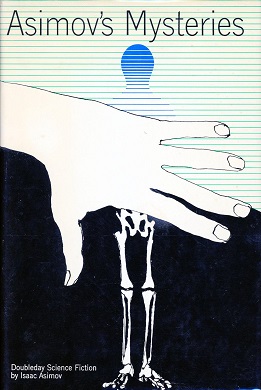By Isaac Asimov.
Science Fiction Book Club.
1999. 745 pages.
Contains: THE CAVES OF STEEL, THE NAKED SUN, THE ROBOTS OF DAWN.
. . . and why are most of them pretty lousy as either detective fiction or SF?
In his own Introduction to ASIMOV'S MYSTERIES (1968), Isaac Asimov (1920-92) tells us he also pondered this particular conundrum:
Oddly enough, it was the mystery form [and not others such as Westerns or romances] that seemed most difficult to amalgamate with science fiction. Surely this is unexpected. One would think that science fiction would blend easily with the mystery. Science itself is so nearly a mystery and the research scientist so nearly a Sherlock Holmes.
And if we want to reverse things, are there not mysteries that make use of the "scientific mind"? R. Austin Freeman's Dr. Thorndyke is an example of a well-known and successful (fictional) scientist-detective.
And yet science fiction writers seemed to be inhibited in the face of the science fiction mystery.
Back in the late 1940s, this was finally explained to me. I was told that "by its very nature" science fiction would not play fair with the reader. In a science fiction story, the detective could say, "But as you know, Watson, ever since 2175, when all Spaniards learned to speak French, Spanish has been a dead language. How came Juan Lopez, then, to speak those significant words in SPANISH?"
Or else, he could have his detective whip out an odd device and say, "As you know, Watson, my pocket-frannistan is perfectly capable of detecting the hidden jewel in a trice."
Such arguments did not impress me.
[Of course] you DON'T spring new devices on the reader and solve the mystery with them. You DON'T take advantage of future history to introduce ad hoc phenomena. In fact, you carefully explain all facets of the future background well in advance so the reader may have a decent chance to see the solution.
But talk is cheap, so I put my typewriter where my mouth was, and in 1953 wrote a science fiction mystery novel called THE CAVES OF STEEL (Doubleday, 1954). It was accepted by the critics as a good science fiction novel AND a good mystery and after it appeared I never heard anyone say that science fiction mysteries were impossible to write. I even wrote a sequel called THE NAKED SUN (Doubleday, 1957) just to show that the first book wasn't an accident. (From ASIMOV'S MYSTERIES, pages 13-15)He later went on to write a third novel, THE ROBOTS OF DAWN (Doubleday, 1983), tying his sleuths into his Foundation series.
Asimov's complaint is still valid: Why aren't SF authors churning out quality science fictional whodunits on a regular basis?


No comments:
Post a Comment